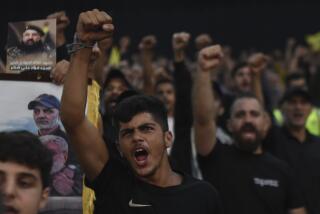Hussein officer finds unlikely defenders
- Share via
BAGHDAD — He was the military commander in a campaign that killed as many as 180,000 Kurds, and he played a key role in suppressing a Shiite uprising against Saddam Hussein. Now, awaiting execution, Hussein’s defense minister has become the focus of an unlikely debate on reconciliation in Iraq.
President Jalal Talabani, a Kurd, and other politicians are arguing that the life of Sultan Hashim Ahmad Jabburi Tai should be spared. While some Shiite Muslim clerics urged during Friday prayers that Tai be hanged, others argued that he was a soldier following orders, and that before the 2003 war that toppled Hussein, he had been in contact with the opposition.
They also are mindful that the messy execution of Hussein in December is regarded by some as proof that the new Shiite-led government is selectively applying justice.
Tai is one of three officials sentenced this summer to hang for their roles in Hussein’s 1988 Anfal campaign. Also awaiting execution are Ali Hassan Majid, Hussein’s first cousin who is known as “Chemical Ali” for his role in the poison-gas killings of the Kurds, and Hussein Rashid Mohammed, the former deputy head of army operations.
The verdict was upheld by an appeals court Sept. 4, but then the case was plunged into limbo.
The executions were delayed during the holy month of Ramadan. Vice President Tariq Hashimi -- who, like Tai, is a Sunni -- then petitioned a Justice Ministry council to decide whether the hangings could be carried out without the approval of the Iraqi Presidential Council, made up of himself, Talabani and Vice President Adel Abdul Mehdi.
The Justice Ministry council declared that the presidential council must endorse the court order, but cannot block it. Both sides see that decision, returned about 10 days ago, as backing their positions.
Tai’s family believes that Talabani’s and Hashimi’s opposition has so far spared his life. An Iraqi official close to the case said Talabani and Hashimi believe that Mehdi, a Shiite, would support them in blocking the execution.
However, the main Shiite parties are opposed to commuting Tai’s sentence because he played a key role in suppressing the 1991 Shiite uprising against Hussein at the end of the Persian Gulf War, the official said. Tai negotiated Iraq’s surrender to the Americans, but won the right to retain helicopter gunships that were later used in beating back the Shiite uprising.
Though no one publicly defends Majid, Tai is regarded by some officials as a good soldier.
Iraqi Foreign Minister Hoshyar Zebari, also a Kurd, acknowledged Tai’s role in the Anfal campaign, but said many people were looking past that in the name of the nation’s future.
“As a sign of reconciliation, many people believe he should be pardoned, or not executed,” Zebari said.
Zebari acknowledged that Tai had been in contact with the Iraqi opposition before the war, and added that he was often touted as a possible replacement for Hussein. It remains a mystery whether Tai cooperated with U.S. forces in the countdown to war.
In September 2003, Tai surrendered voluntarily to Army Gen. David H. Petraeus, who was then in charge of the northern city of Mosul. Petraeus is now the overall commander of U.S. forces in Iraq.
“Before turning himself in, he . . . said, ‘I’m innocent. I haven’t done anything I’m ashamed of,’ ” his son, Ahmed Hashim Tai, said in a telephone interview. The son said he believed the Americans and Petraeus had reneged on a promise to protect his father.
Prime Minister Nouri Maliki, a Shiite, has not made it clear whether he thinks Tai should hang, but Mariam Rayes, who resigned last week as a legal advisor to Maliki, said the prime minister had decided not to interfere with the court orders.
Rayes, with the main Shiite political bloc, said she was against Tai’s execution. “There are some sides in the government like Tariq Hashimi and . . . also me that asked to lift the death penalty against Sultan Hashim, as he was following orders and would have faced death if he hadn’t done what he was ordered to do,” she said.
Iraq’s rifts were reflected Friday in Sunni and Shiite mosques, where Shiite clerics argued for Tai’s death and Sunni preachers urged that he be pardoned.
“We are asking to accelerate the implementation of the execution decision against the three convicts from the Anfal case,” Sadruddin Qubanchi, a prominent cleric aligned with the Supreme Islamic Iraqi Council, said in the Shiite holy city of Najaf. “We refuse any pressure applied to prevent the executions.”
In neighboring Jordan, 17 former Iraqi generals issued a statement calling on the Iraqi government to spare Tai’s life.
“Please halt your spirit of vendettas and revenge,” said Lt. Gen. Raad Hamdani, a former commander of Hussein’s elite Republican Guard. “You are also calling for a new era.”
--
Times staff writers Saif Hameed and Saif Rasheed in Baghdad and special correspondent Ranya Kadri in Amman, Jordan, contributed to this report.
More to Read
Sign up for Essential California
The most important California stories and recommendations in your inbox every morning.
You may occasionally receive promotional content from the Los Angeles Times.













